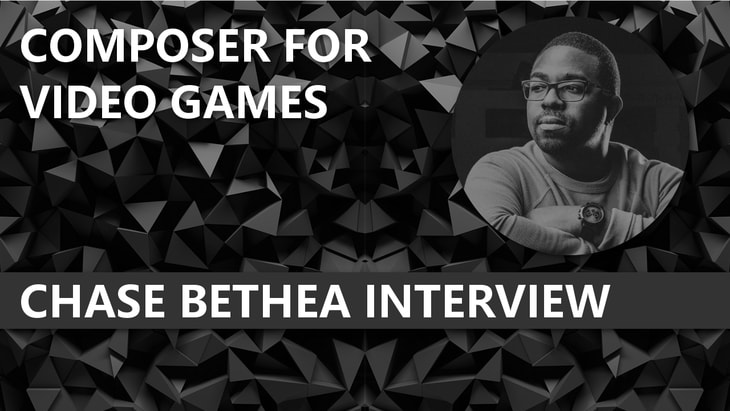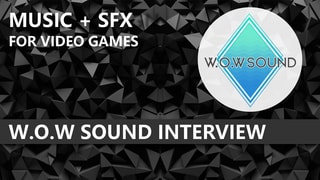Updated: Jun 03, 2019
Share!
Chase Bethea Interview - Composer for Video Games

In this interview with Chase Bethea, we’ll be talking about the journey of a video game music (VGM) composer and some of the process behind creating!
Not only that but Chase talks about what you may expect going from different stages of work such as aspiring, part-time, and full-time.
So, if you make music outside of games, want to start composing, or are just curious about learning about it, this is the interview for you.
Q: Let’s begin with an introduction of yourself, what you’ve done and what you’re currently doing.
I have been a video gamer since I was five years old and I would play any and all games that I could. I was in band and choir from fifth to seventh grade. As a teenager, I started making music and all the tracks I would create people would tell me it sounded like it should be in a video game. After hearing that for several years, I looked into it being a career and discovered it was. I decided to marry my two passions, games and music, together, I got an internship at a game studio in Culver City and demoed for game projects. I landed my first solid lead in 2011 and have not looked back.
My list of credits has been getting longer. I have done a lot. I used to be an audio engineer in my adolescence and early twenties. Now as a composer, I have shipped 16 games in six years, graduated with two more degrees (Composition and Media Composition), worked with companies such as VRC, Universal, Disney for sound design and did some video game arrangements for college orchestras. I have also been public speaking at colleges and game conferences.
Currently, I am focused on scoring about three game projects, one of which will be at E3 and ship later this year, and hopefully procuring three more projects.
Q: As you started making music from Hip-hop, what do you think is the biggest benefit or take away from starting in a stand-alone genre of music?
I think the biggest takeaway from starting in any stand-alone genre of music is the understanding the timbre and culture of it. You can focus on the “formula” of the musical form of what makes the genre audibly recognizable and study the micro details of the music. This knowledge can be applied to your music. The culture can influence your music and determine how deep it can truly go. All of these are imperative keys yet small pieces of the puzzle to your distinguished sound.
Q: What does your process look like when it comes to making music?
When it comes to making music, I tend to always try something that I have not done before. Writing in a new mode, studying a new drum rhythm, writing in a new time signature, using a synth but creating the sound from an “init” patch. There is more but lately, I feel this has been pushing me to be more creative and less lazy when writing.
My niche sound seems to replicate how some real conversations occur. For example, when you are speaking to someone and they interrupt you, go on tangents, silences/pauses or a change in topic. The story of my music comes down to part traditional, part non-traditional, part Avant-Garde. It depends on the context but since I score for games mostly it correlates with the whole art-form.
Q: What does the contrast look like between aspiring, part-time, and full-time composing? (Stress, workload, overall, work-life balance, etc.)
Wow! Great question. Someone looking to get into the industry just emailed me tonight about how to find more work as an aspiring composer. I will answer all three tiers as best as I can from my experience.
When I was getting started in my career I had heard the phrase, “It is not what you know but who you know.” Well, several years later, I am here to tell you this is partially true.
You do need to meet and know people in order to get work. Whether it is online, at a nail salon, or shopping at a grocery store. Connections can happen everywhere and anywhere but you are not going to meet them if you do not try first.
Once you know people looking for your services then the work starts to happen and then you must deliver (the what you know part). I personally believe that you need to know your craft well and be confident at the same time with finding “who to know”. Who to know can take time, for those people to trust you and want to work with you. It takes a long time to build trust and only a second to break it. I feel like when you are starting out in your career that you are willing to take on any project and multiple ones as well just to get your foot in the door. This experience can be exciting, frustrating, disheartening and confusing consecutively.
When you’re a part-time composer all that is on your brain is “Okay, I’m almost there. How can I do this full-time and be ensconced?” Then, a million questions run through your head. How can you be more heuristic? What new libraries should you buy for your demo to stand out? The questions go on and on. Tunnel vision begins and you’ll find yourself absorbed and almost obsessed with how to quit your day job to do what you love. This can be stressful too if you’re not pacing yourself properly with the understanding that it is a marathon, not a race.
The work-life balance can slide away during this transition as well. It is best to take it day by day but set monthly goals that are attainable and do not beat yourself down if you miss a few personal milestones. You are only one person.
When you’re full-time, work is in full swing and you have to either run your business by yourself (hunt for work/do the work, self promote, pay bills and taxes, etc) or you’re working full-time in the studio and all you have to do is show up and write music in time.
Either way, the one thing in common is deadlines. Depending on where and who you are employed by, some deadlines are more flexible than others. All of the emotions are on deck at this point (fun, exciting, tiring, exhaustion, frustration, anxious, exhilarating and rewarding).
Q: What is your ideal position as a composer and how has that vision changed over time?
My ideal position as a composer would be to work for an independent studio that develops AAA quality titles. I would like to get paid my proper rate so that I may live, save money and provide for my family, have full benefits, proper vacation, paternal and bereavement time (more than 2 weeks).
In addition, I would like proper raises, decent work hours, work days and deadlines. If I could work from home sometimes and have to come in the office when I want or need to that would be great as well. This is my most ideal position but I know I am a little bit away from it.
The vision has changed as I have grown and experienced and become more acumen working as a freelancer for different clients. I was also hearing about friends and colleagues’ time being in-house at a studio and their stories. In the beginning, I just wanted to work in-house as a composer. Over the years, as I visited and worked at different game development studios, the paramount necessities that go beyond just having a position became more clear.
Q: What is your best advice to anyone in music production for film or games?
Stay humble and magnanimous. No matter how big your career gets or does not get, always stay humble. Also, if you do not love what you do then quit. Life is too short to do something you are not passionate about.
If you want to learn more about Chase, check out his website!
I hope this helps you along your journey as a composer, thanks for reading.
Share!
Join the newsletter for free stuff and some knowledge too!
Everything you need. No Spam. A heads up before others do.









